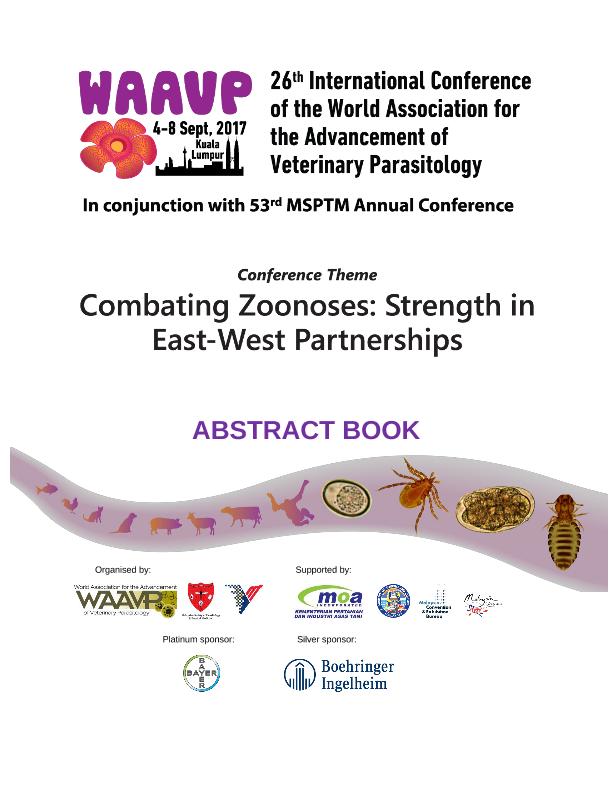Evento
Inadequate management of anthelmintic resistance: a real-world case in a cattle commercial farm
Cantón, Candela ; Ceballos, Laura
; Ceballos, Laura ; Moreno Torrejon, Laura
; Moreno Torrejon, Laura ; Fiel, Cesar Alberto; Dominguez, Maria Paula
; Fiel, Cesar Alberto; Dominguez, Maria Paula ; Cantón, Lucila
; Cantón, Lucila ; Bernat, Giselle; Lanusse, Carlos Edmundo
; Bernat, Giselle; Lanusse, Carlos Edmundo ; Alvarez, Luis Ignacio
; Alvarez, Luis Ignacio
 ; Ceballos, Laura
; Ceballos, Laura ; Moreno Torrejon, Laura
; Moreno Torrejon, Laura ; Fiel, Cesar Alberto; Dominguez, Maria Paula
; Fiel, Cesar Alberto; Dominguez, Maria Paula ; Cantón, Lucila
; Cantón, Lucila ; Bernat, Giselle; Lanusse, Carlos Edmundo
; Bernat, Giselle; Lanusse, Carlos Edmundo ; Alvarez, Luis Ignacio
; Alvarez, Luis Ignacio
Tipo del evento:
Conferencia
Nombre del evento:
26º Conference of the World Association for the Advancement of Veterinary Parasitology
Fecha del evento:
04/09/2017
Institución Organizadora:
World Association for the Advancement of Veterinary Parasitology;
Título del Libro:
Abstract Book: 26º Conference of the World Association for the Advancement of Veterinary Parasitology
Título de la revista:
Abstract Book
Editorial:
World Association for the Advancement of Veterinary Parasitology
Idioma:
Inglés
Clasificación temática:
Resumen
Routine Faecal Egg Count Reduction Tests (FECRT) in a cattle commercial farm shows the effect of an inadequate management in the introduction of gastrointestinal nematodes resistant to different macrocyclic lactones (ivermectin-IVM-, moxidectin-MXD-, eprinomectin-EPR-, abamectin-ABA- and doramectin-DRM-). The "case-study" farm had been a cow-calf system for many years in the past, with low (1-2) anthelmintic treatments each year. However, it changed its productive activity to grazing cattle fattening in 2015, based in the introduction of steers from different farms, which are treated at arrival with IVM to prevent sarcoptic mange. In 2015, the efficacy (calculated by FECRT) against Haemonchus spp. was 42% (IVM) and 97% (MXD), while the efficacy against Cooperia spp. was 78% (IVM) and 98% (MXD). The presence of resistance to IVM was evident, while MXD maintain highly levels of efficacy. The next year, the efficacy against Haemonchus spp. dropped to 0% (IVMsc), 72% (MXD), 28% (EPR), 7% (ABA), 0% (DRM) and 5% (IVMoral), while the efficacy against Cooperia spp. was varied: 0% (IVM), 97% (MXD), 100% (EPR), 0% (ABA), 0% (DRM) and 0% (IVMoral). The efficacy against Ostertagia spp. was 100% for all treatments. The drastic decline in the efficacy of IVM and the very low efficacies obtained for all macrocyclic lactones treatments in 2016 (even for MXD and IVMoral) could be explained by some inadequate management measures: the selection of resistant population by the IVM treatment used as preventive of sarcoptic mange at the arrival of animals to the farm (although it was only one treatment), and the lack of quarantine procedures to avoid the introduction of parasite strains highly-resistant to macrocyclic lactones.
Palabras clave:
Ivermectin
,
Anthelmintic resistance
,
Inadequate management
Archivos asociados
Licencia
Identificadores
Colecciones
Eventos(CCT - TANDIL)
Eventos de CTRO CIENTIFICO TECNOLOGICO CONICET - TANDIL
Eventos de CTRO CIENTIFICO TECNOLOGICO CONICET - TANDIL
Eventos(CIVETAN)
Eventos de CENTRO DE INVESTIGACION VETERINARIA DE TANDIL
Eventos de CENTRO DE INVESTIGACION VETERINARIA DE TANDIL
Citación
Inadequate management of anthelmintic resistance: a real-world case in a cattle commercial farm; 26º Conference of the World Association for the Advancement of Veterinary Parasitology; Kuala Lumpur; Malasia; 2017; 420-420
Compartir



